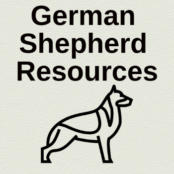Your German Shepherd is not just a pet; they’re a companion, a member of the family, and a breed known for their intelligence, loyalty, and versatility. However, this noble and capable dog is also prone to weight issues if not given the proper care and attention to diet and exercise. With German Shepherds being one of the most popular canines worldwide, it’s essential to understand how to keep them healthy to ensure they live long, fulfilling lives by your side. This comprehensive guide will walk you through the most effective and reliable dog weight management strategies for your German Shepherd, ensuring they stay in top shape throughout every stage of their life.
Table of Contents
The Importance of Maintaining a Healthy Weight for German Shepherds
The weight of your German Shepherd can significantly impact its quality of life. Excess weight can lead to a variety of health issues, including joint problems, heart disease, and diabetes. On the other hand, being underweight could indicate an underlying health problem or lack of proper nutrition, leading to a weakened immune system and malnourishment.
Weight management is a key aspect of responsible pet ownership, affecting not only the dog’s health but also its behavior, longevity, and overall well-being.
Understanding the Ideal Weight for German Shepherds
Before you can effectively manage your German Shepherd’s weight, it’s crucial to determine what their ideal weight should be. This figure is influenced by several factors, including age, sex, and individual variations. For instance, a male German Shepherd may weigh between 65 to 90 pounds, while a female may fall between 50 to 70 pounds. However, numbers only tell part of the story; the key is to assess the breed’s body composition for an accurate measure of health.
Characteristics of a Healthy Weight
A healthy-weight German Shepherd will display certain physical traits, such as:
- A visible and defined waistline when viewed from above
- A “tuck-up” behind the ribs when viewed from the side
- Ribs that can be felt beneath the skin without excess fat cover
- A flat back when standing or gently sloping when running
If your dog’s body doesn’t exhibit these characteristics, it may be time to adjust their weight management plan.
Risks Associated with Obesity or Underweight
Obesity in German Shepherds can lead to conditions such as arthritis, hip dysplasia, and pancreatitis. On the other hand, being underweight can be a sign of malnutrition or underlying health problems, which can affect their energy levels and overall health.
To get a clearer understanding of healthy weight standards, consult with your veterinarian, and make adjustments to your pet’s lifestyle as needed.
Nutritional Management
A balanced diet is the bedrock of managing your German Shepherd’s weight. What they eat, and how much, will have a profound impact on their health and vitality. Feed them well, and you’ll see the benefits in their coat, energy levels, and longevity.
Importance of a Balanced Diet Tailored to the Breed’s Needs
German Shepherds require a diet rich in high-quality proteins, healthy fats, and essential vitamins and minerals. Their unique breed needs dictate that the diet should support their activity levels, muscle development, and overall health.
Recommended Food Types and Portion Sizes
Opt for premium dog food that lists meat as the primary ingredient. Avoid fillers such as grains to minimize unnecessary intake of carbohydrates, which could contribute to weight gain. Work with your veterinarian to determine appropriate portion sizes based on your pet’s size, age, and activity level. Stay away from bone meal, animal by-products, artificial flavors, corn, soy, wheat and soy. Specific meals, listed as “beef meal” or “chicken meal” are fine.
Tips:
- High quality food may seem expensive. But because it is high quality, you may not need to feed as much.
- Check often for recalls. I have had to change Jasper’s food three times so far because of recall. I have since learned to check often. https://www.fda.gov/safety/recalls-market-withdrawals-safety-alerts/archive-recalls-market-withdrawals-safety-alerts
- Feed your dog at the same time each day, and avoid leaving food out all day as this can lead to overeating. Give your dog 15 minutes to eat then take the food up and serve it again the next meal.
- Because German Shepherds tend toward bloat, which is a life threatening condition, feed in two meals a day.
- If you give your German Shepherd treats, make sure to account for them in their daily calorie intake. For instance, Jasper gets 3 cups of food a day. I measure this out and use a special freeze dried dog food as treats. This supplements his kibble. But the total amount of all his food per day, including the freeze dried I use as treats, is 3 cups. If he has an unusual amount of exercise, I will add an extra cup.
Hydration is Key
Water is essential for a healthy weight and overall well-being. Keep water available, but be careful after any intensive exercise, as drinking too much too fast can cause bloat. Let your dog have a small drink then make him rest an hour and go back for more.
The Role of Supplements
Supplements can be a valuable addition to your German Shepherd’s diet. For example, joint supplements containing glucosamine and chondroitin can help maintain healthy joints, especially as your dog ages. I use a supplement on every bowl of Jasper food. Just be careful to research and use high quality supplements that are transparent on ingredients.
Exercise Regimen
German Shepherds are an active breed that thrives on physical and mental stimulation. Regular exercise is non-negotiable when it comes to managing their weight and keeping them happy.
The Significance of Regular Exercise
Exercise helps burn calories, build muscle, and maintain a healthy metabolism. It also provides an outlet for their abundant energy, reducing the risk of behavior problems associated with boredom or lack of activity.
Different Types of Exercises Appropriate for German Shepherds
Activities such as walking, running, hiking, swimming, agility training, and obedience classes are all excellent for German Shepherds. These exercises not only keep them in shape but also allow them to engage with their owners and exhibit their natural working instincts.
Tips for Incorporating Exercise into the Daily Routine
Commit to regular walks, playtime, or specific training sessions each day. Make exercise a part of your routine, and it will become a cherished ritual for you and your dog.
Here’s a tip for those of you whose German Shepherds prefer “keep away” to fetch! Use two balls on a string. Throw the first one, and when you keep away king considers not bringing it back, show him the second. When he comes close and drops the first, throw the second.
Health Monitoring and Veterinary Care
Regular check-ups are invaluable in monitoring your German Shepherd’s weight and overall health. Your vet can provide advice on maintaining an ideal weight and identify any health concerns early on.
Regular Check-Ups and Weight Monitoring
Schedule routine vet visits to have your German Shepherd weighed and assessed. These visits will also ensure your dog is up to date with vaccinations and provide an opportunity to discuss any changes in diet or lifestyle.
Addressing Weight-Related Health Issues
If your dog is overweight or underweight, your vet can provide guidance on the next steps, which may include dietary adjustments, exercise plans, or even blood tests to rule out medical conditions.
The Role of Veterinary Nutritionists
In complex cases, a veterinary nutritionist can create a customized diet plan tailored to your German Shepherd’s health needs and weight management goals.
Behavioral and Environmental Considerations
Your dog’s eating behavior and environment can impact their weight. By being mindful of these factors, you can create an environment that supports a healthy weight.
Understanding the Impact of Feeding Behaviors
Some dogs may exhibit “scarf-and-barf” behavior, consuming food too quickly and vomiting, which can lead to overfeeding. Consider slow-feeder bowls or puzzle toys to encourage slower, more mindful eating.
The Importance of a Consistent Feeding Schedule
Maintain a consistent feeding schedule to regulate your dog’s metabolism and prevent overeating. Free feeding can lead to excessive caloric intake, especially in multiple-pet households where food competition may be a factor.
Environmental Factors that Influence Weight
External factors such as stress, changes in routine, and the presence of other animals can impact your dog’s eating habits. Ensuring a calm and consistent environment can help them to maintain healthy eating habits and weight.
Success Stories and Case Studies
Real-life examples can serve as inspiration and provide practical insights into successful weight management for German Shepherds. Sharing these stories can motivate and guide other dog owners on their own weight management journeys.
Consider the story of Max, a 5-year-old German Shepherd who was 20 pounds overweight due to a lack of exercise and poor diet. His owners worked with a veterinary nutritionist to design a specific diet plan, incorporating high-quality, lean proteins, and vegetables. They also gradually increased Max’s daily exercise, starting with short walks that eventually turned into hiking adventures. After six months, not only did Max reach, his ideal weight, but his energy levels and overall health significantly improved.
Another case is Bella, a 3-year-old German Shepherd residing in a bustling urban environment, which limited her physical activity. Her vet recommended interactive toys and puzzle feeders to stimulate her mentally and slow down her eating. Bella’s family also started taking her to a nearby dog park for playtime with other dogs, increasing her physical activity. These changes helped Bella lose the excess weight and become more agile and active.
Lessons Learned and Best Practices
A collection of best practices, learned from personal experiences or through research, can be invaluable for dog owners seeking to manage their German Shepherd’s weight effectively. –
- Monitor Diet Intake: Focus on feeding high-quality, lean proteins and vegetables, avoiding overfeeding. Consulting a veterinary nutritionist can provide a tailored diet plan.
- Increase Physical Activity: Gradually introduce more exercise into your dog’s routine, ranging from short walks to more strenuous activities like hiking, based on their health and fitness level.
- Utilize Interactive Toys: In environments where outdoor activities are limited, interactive toys and puzzle feeders can help keep your dog mentally stimulated and physically active.
- Regular Vet Check-ups: Schedule regular veterinary checkups to monitor your dog’s weight and overall health, adjusting their diet and exercise plan as needed.
- Engage in Social Play: Whenever possible, engage your German Shepherd in social play with other dogs, which can motivate them to be more active.
- Be Consistent: Consistency in both diet and exercise routines is key to achieving and maintaining a healthy weight.
Summary and Key Takeaways
In summary, weight management for your German Shepherd involves a comprehensive approach that considers diet, exercise, veterinary care, and environmental factors. By taking a proactive stance on these elements, you can ensure that your German Shepherd maintains an ideal weight and enjoys a vibrant, healthy life.
Encouragement and Advice for Implementing These Strategies
Commit to the long-term health of your German Shepherd by implementing the strategies discussed in this guide. Stay patient and consistent, and remember that every small change you make contributes to their overall well-being. Your efforts will be rewarded with a healthier, happier companion who’s sure to fill your life with joy and love.

